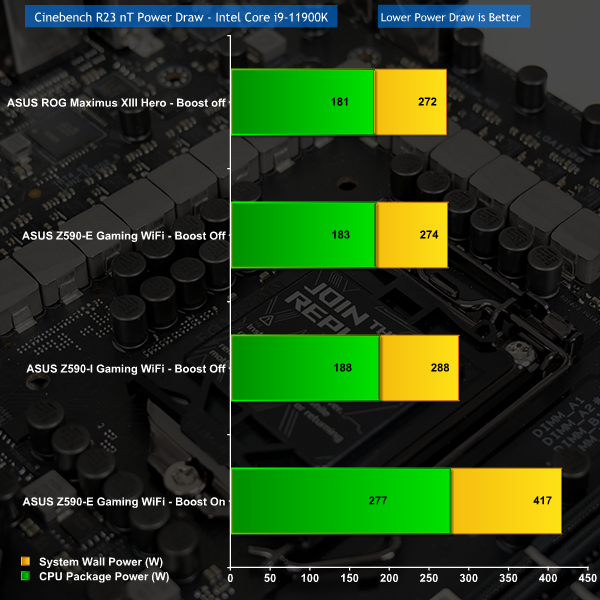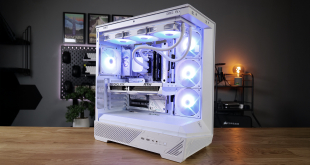Power Consumption
For CPU load results we run Cinebench nT on loop and take readings. The power consumption of the CPU package and our entire test system (at the wall) is shown in the chart.
Looking at power draw when running 30 minutes of Cinebench R23 nT on loop, we see some interesting results. The Hero looks to have the most efficient power delivery system albeit by a very minor margin. Realistically, we would say the Z590-E is equally efficient despite using a slightly lesser performance set of VRM components.
The ITX Z590-I cannot keep pace with the 14-stage VCore setups from the ATX boards. This represents as slightly higher CPU package power draw and system consumption at the wall, despite offering the same performance.
Applying Adaptive Boost sees the power consumption numbers skyrocket. The package power spirals up to 277W and the wall power increase by more than 140W. All that for an extra 300-400MHz doesn’t seem worth it from an efficiency and cooling standpoint.
System Temperatures
We run a Cinebench nT loop stress test while recording the system data using HWInfo. This data is then analysed to show the temperatures.
VRM cooling performance is excellent on both the Maximus XIII Hero and the Z590-E Gaming WiFi. This is unsurprising given their similarly oversized heatsink designs and 14 power delivery stages for the CPU VCore.
Impressively, the Z590-E Gaming WiFi maintains a sub-70C VRM temperature even when shifting 277W to the Core i9-11900K with Adaptive Boost enabled. This is a very strong result and had us thoroughly impressed even if it was whilst installed inside a chassis with custom liquid cooling on the CPU.
The Z590-I struggles a little more with managing the power requirements of the 11900K. 69C is certainly a reasonable result for a CPU load of almost 190W. However, the 30mm fan was spinning around the 2000 RPM level to achieve this result. Thankfully, the VRM fan was completely inaudible over our 280mm AIO liquid cooler.
 KitGuru KitGuru.net – Tech News | Hardware News | Hardware Reviews | IOS | Mobile | Gaming | Graphics Cards
KitGuru KitGuru.net – Tech News | Hardware News | Hardware Reviews | IOS | Mobile | Gaming | Graphics Cards




